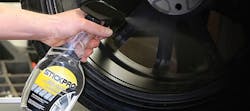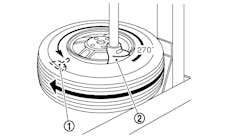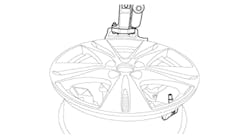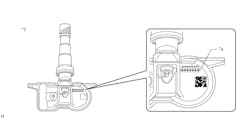Bans on the use of lead weights, efforts to reduce vehicle weight to improve fuel economy, and the popularity of custom wheels are creating more wheel weight choices for passenger tire dealers.
When lead wheel weights are banned, many dealers switch to steel weights at first, according to Gregory Parker, marketing manager for Wegmann automotive USA Inc., the parent company to the Perfect Equipment and Hofmann Power Weight brands.
“In the seven states with a lead ban we have seen customers jump on the cheapest option when they initially transition away from lead and then thereafter realize that maybe the product they chose is not working for their business,” says Parker.
“They tend to move toward a more premium, soft-metal solution given time because those solutions are more forgiving and easier to work with and traditionally have fewer issues across the board. We have seen this with small single-store shops to some of the country’s largest tire chains.”
Plombco Inc. also has seen dealers turn to steel weights when legislation prohibiting lead weights is passed. “In the states and communities where lead has been banned, steel has been the most popular non-lead option while zinc use trails behind steel,” says Emilie St-Onge, marketing director for the Valleyfield, Quebec-based company.
St-Onge says Plombco is the only wheel weight company that manufactures steel, zinc and the exclusive Plasteel wheel weight. “Plasteel is a steel weight that is covered in plastic, and that eliminates scratched or damaged wheels caused by the hardness of steel and zinc. The tire installers using Plasteel wheel weights have stated they are the easiest to use and the most economical alternative to lead. Plasteel is our fastest growing product line.”
Use of adhesives grows
The use of clip-on wheel weights is decreasing as original equipment manufacturers move toward more adhesive wheel weight automation at the factory level. “With this you are seeing a growth in flangeless rims and thus a growth in adhesive weight usage inside the aftermarket,” says Parker.
St-Onge says that as the passenger car market trends toward more flangeless wheels, the need for clip-style wheel weights will decline. “We expect that adhesive or stick-on wheel weight use will continue to increase.”
A decline in the use of steel wheels and the traditional wheel cover is also affecting clip-on weights. “The clip-style weight used for steel wheels is also fading,” says St-Onge. “The Corporate Average Fuel Economy (CAFE) standards have led car manufacturers to find ways of reducing vehicle weight. Steel wheels are typically heavier than aluminum and alloy wheels so this is another factor in the decline of clip-style wheel weights.”
Parker says the use of soft metal clip-on weights is growing. “The softer metals help reduce rim scratches during installation and they can be removed more easily when you have a repeat customer bringing their vehicle back for a rebalance,” he says.
Consumer tastes are also influencing the wheel weight market. “We all love our cars and of course appearance is very important,” says St-Onge. “Millions of cars on the road today have custom wheels and that trend will continue as most every car manufacturer installs the lighter aluminum alloy.
“Consumers do not like the appearance of a clip style wheel weight on their nice looking custom wheels,” according to St-Onge, “Therefore, they opt for the adhesive weight that is placed on the inside of the wheel. There are many wheels that come in different colors such as chrome and especially black. We are also experiencing a growing category in colored adhesive weights, primarily black and chrome.”
Test non-lead options
Both St-Onge and Parker expect the lead-free movement to continue. They urge tire dealers to investigate all non-lead options.
“Recently, the United States Environmental Protection Agency (EPA) had a formal hearing to discuss banning lead wheel weights. Wheel weight manufacturers, national retailers, environmental groups, states that have already passed legislation, and others participated. All parties agree that a lead wheel weight ban should be enacted at the federal level,” says St-Onge.
Despite the input from the parties at the hearing, EPA has no plans to move forward with legislation at the federal level, according to St-Onge. “Our advice is to discontinue the use of lead wheel weights. There are products available that are less expensive, readily available, and non-toxic.”
She says it is a best business practice to use non-lead wheel weights. “There is absolutely no reason why lead wheel weights should not be banned. Non-lead alternatives such as Plasteel and steel are cheaper than lead and readily available.”
Canada has been studying the lead wheel weight issue, but there has been no movement or consideration in recent months, according to St-Onge. “The Canadian government has made the decision to let the market dictate the use and demand of non-lead wheel weights. Our experience in the United States shows this strategy does not work.”
St-Onge points out that many national and large regional tire installers have not been using lead weights for quite some time. “These companies did not wait for legislation to pass and took it upon themselves to make the change as good corporate citizens. However, as long as lead wheel weight use is permitted, there will continue to be companies using lead wheel weights. It is up to us as an industry to continue to promote the use of non-lead wheel weight products.”
Parker advises dealers to investigate and test the non-lead options. “The number one main thing a tire dealer needs to do when considering a transition away from lead is test the options. Test them all. Don’t judge on price and marketing tactics alone. Every supplier tries to steer the market towards their particular option but the only way to find the right solution for your business is to test.”




